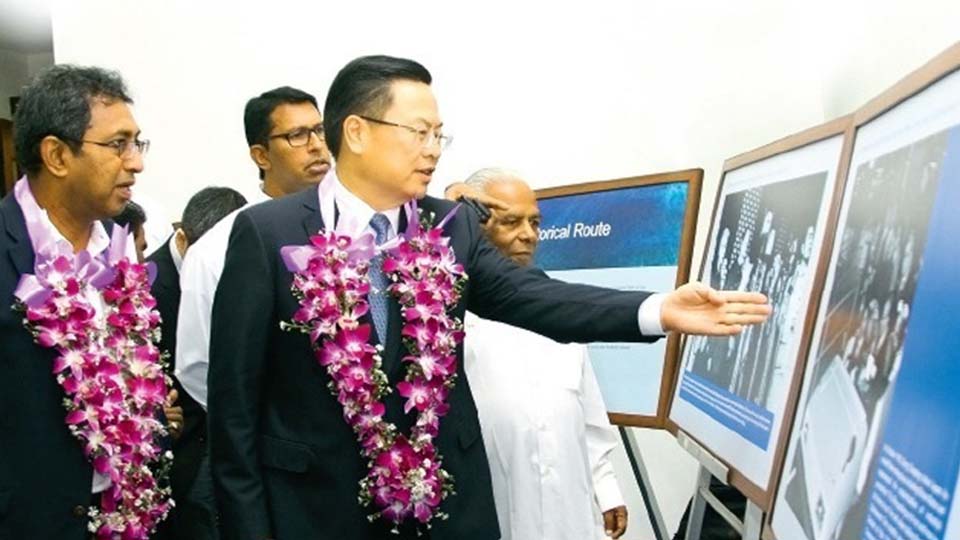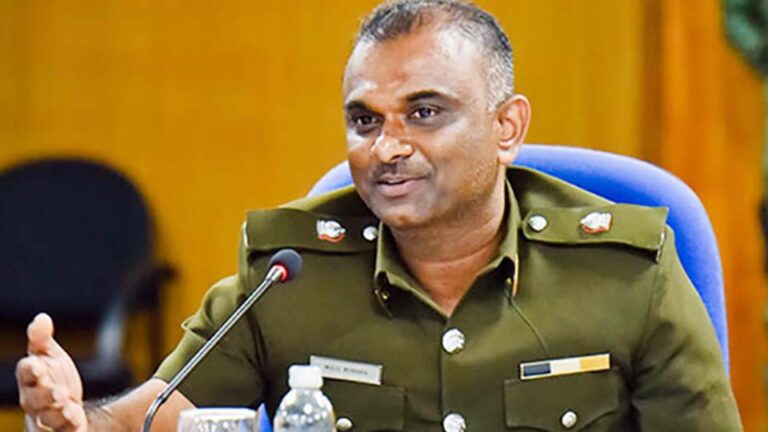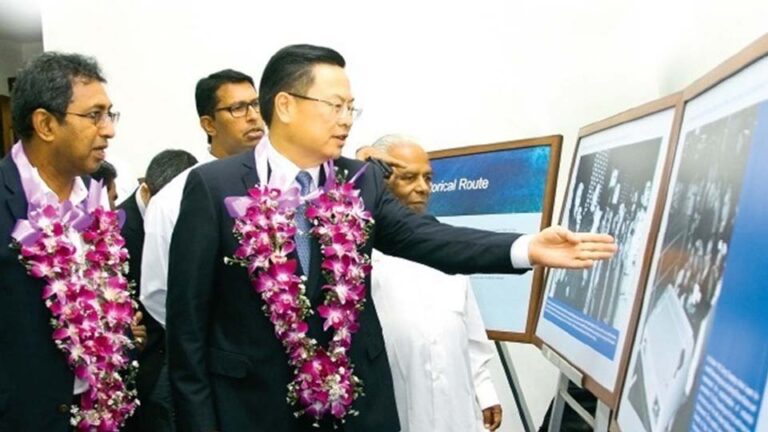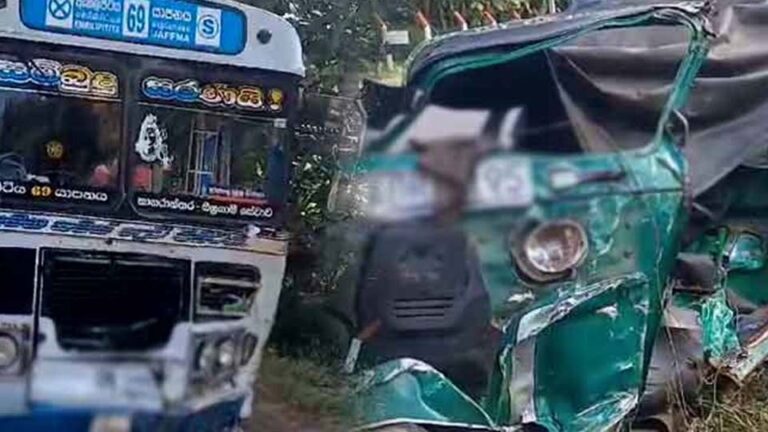- Communist Party General Secretary Dr G Weerasinghe says the announcement of bankruptcy on 12th April’22 is the biggest and most treacherous conspiracy in 100 years: also says that action has led to a massive social explosion in the country.
- The US-based National Democratic Institute with USAID funding organises a 10-day visit for Chairman of all Oversight Committees of Parliament, numbering nearly 20, to make a visit to the USA: controversy surrounds an alleged suggestion by the US authorities that Parliament name a member of the minority community to represent the Parliamentary Oversight Committee on National Security, as the incumbent Chairman of the Committee Rear Admiral (retd) Sarath Weerasekera MP can’t be issued a visa in time for him to join the Parliamentary delegation.
- Minister of Justice Dr Wijeyadasa Rajapakse says Sri Lanka has received USD 890,000 and Rs.16 mn as interim payments for the X-Press Pearl disaster: according to Govt sources, the damages claimed was over USD 6,000 mn.
- State Finance Minister Ranjith Siyambalapitiya expresses hope of avoiding a repeated default once the foreign debt repayment starts due to a “practical debt restructuring process”: boasts of an “economic recovery”: analysts however point out that the GDP has sharply contracted by 8.4%, 11.8%, 12.4%, 7.8%, 11.5%, & 3.1% in the past 6 quarters, unpaid forex debt since April’22 has risen to almost USD 7,000 mn, and job losses well exceed 1 mn.
- A senior Power & Energy Ministry official says US-based RM Parks Company will start fuel distribution next month through 150 fuel stations allocated by the Ceylon Petroleum Corporation: RM Parks, which operates under Shell PLC, will become the 4th retailer to enter the country’s fuel market after CPC, LIOC & Sinopec.
- Planters’ Association of Ceylon Chairman Senaka Alawattegama urges Plantation companies to engage in an open dialogue & collaborate purposefully to navigate the challenges and secure a sustainable future for the entire sector.
- Police arrest 7 staff members of the Cargills supermarket in Borella, over an incident of the brutal assault of a female customer: Police launch the investigations after a video showing the assault, went viral on social media.
- Police say a 61-year-old entrepreneur and father-in-law of State Minister D V Chanaka, Lalith Wasantha Mendis, was killed by unidentified gunmen while travelling in a car in Galle: no suspects arrested so far.
- The People’s Action for Free and Fair Elections says the decision to cancel the Local Govt polls nominations will cause a loss of more than Rs.1 billion to the state.
- Sri Lanka Women beat Pakistan Women by 6 wickets to book a place in the Final against India, in the Women’s Cricket Competition in the Asian Games currently being worked off in China: the Final to be played today (25).
Sri Lanka Original Narrative Summary: 25/09
Milk Powder Importers Assure Stable Prices Despite Tax Increase
The Milk Powder Importer’s Association has reassured consumers that there will be no immediate price hike in the milk powder market, despite the recent 10% increase in taxes on imported milk powder by the Trade Ministry, which came into effect last Friday.
A spokesperson for the Milk Powder Importer’s Association explained, “The cost of one kilogram of milk powder upon arrival at the Colombo port stands at Rs.1,100. This high cost is primarily attributed to the inefficiencies in local milk production and the ineffectiveness of local milk production projects over the past two decades. Despite the importation of more than 20,000 dairy cows from abroad, all these animals have unfortunately perished. Over the past 30 years, this is the highest amount of tax we’ve paid on milk powder.”
The spokesperson further stated, “In the absence of taxes, we could offer imported milk powder at Rs.600 to Rs.625 per kilogram. Currently, due to a decline of over 50% in milk trade in recent months, we have sufficient milk supply for the next two to three months, negating the need for an immediate price increase. However, if taxes are not reduced, we may be forced to consider a price hike in December or January.”
In response to concerns, Trade Commerce and Food Security Minister Nalin Fernando emphasized the government’s commitment to supporting local farmers and protecting their interests. He explained, “We cannot significantly reduce the price of milk powder, as it would negatively impact our local farming community. Our farmers received relief when global milk powder prices decreased in the past. Even with a 10% tax increase, if milk prices rise, we will take the necessary actions to address the situation.”
Showers expected in Western, Sabaragamuwa and North-western provinces
Several spells of showers will occur in Western, Sabaragamuwa and North-western provinces and in Galle and Matara districts.
Showers or thundershowers will occur at several places in Central, Uva and Eastern provinces during the evening or night.
General public is kindly requested to take adequate precautions to minimize damages caused by temporary localized strong winds and lightning during thundershowers.
Plans to regulate school canteens
Colombo (LNW): School canteens across the country will be regulated, in a move to address the issue of such canteens serving inappropriate food options to children, announced the Public Health Inspectors’ Association of Sri Lanka.
Accordingly, school food services will be closely monitored in compliance with the guidelines outlining which foods are deemed safe for students and which can be offered in school canteens, said Union Chief Upul Rohana.
These guidelines have been issued via a circular, he went on, adding that school authorities and the individuals who maintain school canteens have also been informed in this regard.
The PHI Chief further pointed out that while there might be challenges pertaining to legal actions under the Food Act, any situation jeopardising student health can be legally addressed.

Sub-committee to probe Health Ministry procurement issues to meet on Wednesday
Colombo (LNW): The Sub-committee formed by the Committee on Public Accounts (CoPA) to delve into the complexities of medicine procurement and shortage is scheduled for its first ever meeting this Wednesday (27).
Representatives from the Ministry of Finance and the Attorney General’s Department would be present, confirmed Sub-committee Chief MP Tissa Attanayake.
The Sub-committee also comprises other MPs including Diana Gamage, Ashok Abeysinghe, Jayantha Ketagoda, and Dr. Harini Amarasuriya.
The Sub-Committee Chief asserted that a comprehensive analysis of the findings will be handed over to the CoPA by November 7.
Meanwhile, another sub-committee has been appointed recently to inspect potential inconsistencies in the Health Ministry. The Sub-committee is chaired by MP Pradeep Undugoda and counts MPs Weerasumana Weerasinghe, Muditha Prishanthi, Manjula Dissanayake, Wimalaweera Dissanayake, and Isuru Dodangoda as its members.

Full investigation on the risk of Nipah virus entering SL via food imports
Colombo (LNW): A full investigation is currently underway on the risk of Nipah virus entering Sri Lanka via imports of food items, Agriculture Minister Mahinda Amaraweera disclosed.
Speaking to media, the Minister noted that the relevant departments have been informed about the investigation.
Accordingly, imports of food items including eggs are being surveilled for any potential risk of carrying the virus into the island, he emphasised.
Nipah is known as a bat-borne, zoonotic virus that causes the Nipah virus infection in humans and other animals, a disease with a high mortality rate.
Despite the authorities’ affirmation on the risk of the virus breaching Sri Lanka being very low, the public is highly concerned, given that it had spread across the state of Kerala, India several times in the past.

Dr. Harsha De Silva: A Tragic Convergence of Idealism and Realpolitik
By Silent Observer
In the labyrinth of political paradoxes, Dr. Harsha De Silva emerges as a tragic Shakespearean figure, seemingly ensnared by the very system he once sought to reform. A learned individual, esteemed by many, Dr. De Silva appears to be following a path trodden by many politicians, a path woven with inconsistencies and shifts in stance, often at odds with previous advocacies.
Machiavelli, in his seminal work, “The Prince,” opines, “The first method for estimating the intelligence of a ruler is to look at the men he has around him.” This notion seems tragically pertinent to Dr. De Silva, who, despite his erudition, seems to be relegated to the typical political manoeuvring characteristic of many Sri Lankan politicians.
Sri Lanka has long suffered from political vacillation, where policies pivot not on the axis of national interest, but often, on a pendulum of political rivalry. The propensity of politicians to alter national policies seemingly out of spite has been a recurrent impediment to foreign direct investment (FDI) and investment promotion, affecting the economic trajectory of the nation since its independence. Such oscillations between support and opposition are symptomatic of the transient nature of political alliances and the perceived amnesia of the electorate. It illustrates Machiavelli’s assertion that “the great majority of mankind are satisfied with appearances, as though they were realities.”
Dr. De Silva, revered for his professional acumen, was expected to transcend such petty political machinations. The populace anticipated a deviation from such transient politicking, a hope rooted in the desire to see professionals like him bring change and stability to Parliament. Yet, the tragedy lies in his seeming transformation into the archetypal politician, as his stance on projects like the port city project appears to sway with his political alignment.
Instances from his career, unmarked by significant accomplishments, seemingly attest to this transformation. The only accolade he has to boast about is the ambulance system available in Sri Lanka which we all thank him for .other than that his career is nothing but “unremarkable”.

He once championed the port city project, extolling its virtues on global platforms during his ministerial tenure. Yet, his current opposition to the same project, terming it a pipe dream,marks a stark divergence from his earlier advocacies.
This shifting stance reflects Machiavelli’s acknowledgment of the volatility and impermanence of political landscapes and allegiances, epitomizing the tragic struggle between idealism and pragmatism. It embodies Machiavelli’s notion that “Everyone sees what you appear to be, few experience what you really are.”
Dr. De Silva’s trajectory seems to resonate with a greater political malaise, where the fluidity of political beliefs and the pursuit of power overshadow steadfast commitment to reform and national development. It serves as a stark reminder of the ephemeral nature of political convictions and the enduring conflict between professional integrity and political expediency.
This transformation of Dr. De Silva echoes a somber, timeless truth, illuminated by both Shakespeare and Machiavelli: the relentless and often futile pursuit of power and idealism in the tumultuous arena of politics, where convictions are as mutable as the winds, and the essence of one’s beliefs is often lost in the turbulent seas of political rivalry and ambition.
In the tragic dance of politics and power, we find ourselves lamenting, “Oh, where have all the steadfast guardians gone?” Where are the soldiers of integrity and bearers of unwavering convictions in the ever-shifting sands of political landscapes?
Are they all puppets now dancing to a geographical master ? One never knows.

Two killed in head-on collision between bus and three-wheeler
Colombo (LNW): Two persons were reportedly killed and three were injured in a road accident in Galewela area this (24) morning, Police said.
According to reports, a three-wheeler collided with a private passenger bus in the Beligamuwa area, Galewela on the Dambulla – Kurunegala main road this morning.
The injured who are reportedly in critical condition have been admitted to the Galewela Hospital, and later transferred to the Dambulla Base Hospital.
Among the deceased were 31 year old and 34 year old males identified as residents of Arachchikattuwa.
The accident is believed to have occurred due to the sleepiness of the drivers, according to Police.

New CB up on DDO conversion deal. 6 traces of misconduct punishable
The press notice issued by the new CB (NCB) on 21 September 2023 (last Thursday) shows a list of new Treasury bonds and Treasury bills issued the Public Debt Department for the conversion of provisional advances and Treasury bills held by the CB under the Domestic Debt Optimization policy (DDO). See link: https://www.cbsl.gov.lk/sites/default/files/cbslweb_documents/press/pr/press_20230921_conversion_of_outstanding_credits_of_cbsl_to_government_into_negotiable_debt_instruments_under_ddo_e.pdf
- Accordingly, 10 new Treasury bonds and 12 existing Treasury bills have been issued to the NCB on 21 September 2023 as indicated below.

- Accordingly, total debt so converted amounted to Rs. 2,713,144,352,006 consisting of Rs. 2,492,347,352,006 into Treasury bonds and Rs. 220,797,000,000 into Treasury bills. Treasury bonds are issuances of new series while Treasury bills are reissuances to existing series.
- The maturity of 10 new Treasury bonds is annualized for 10 years ranging from 15 March 2029 to 15 June 2038. The maturity of 12 Treasury bills ranges from 5 months to 12 months in 2024 .
- Therefore, it appears that the NCB has restructured nearly 94% of total outstanding credit granted (of around Rs. 2,900 bn, i.e., Rs. 344 bn of provisional advances and Rs. 2,556 bn of Treasury bills) to the government through provisional advances and direct purchase of Treasury bills.
However, 6 areas of misconduct can be traced on the conversion deal as revealed from the limited information disclosed in the NCB press notice. These could be seen as insider acts pursued to raise financial benefits unduly to the NCB at a disadvantage to the government against the very objective of DDO strategy approved by the Parliament.
The purpose of this short article is to highlight those 6 traces as given below. The target audience of the article is the group of professionals interested in the insight into the true outcome of the DDO process and relevant policy-makers.
1. Additional cost burden to debt service
Although the interest was not charged on provisional advances around Rs. 345 bn, the government now has to pay interest on converted bonds and bills. For example, converted bonds receive half-yearly coupons at 12.4%, 7.5% and 5% over the maturity. However, the additional interest cost to the government cannot be estimated as details of the conversion (i.e., underlying debt, interest rate and converted securities) are not disclosed.
2. Maturity restructuring not easing the debt unsustainability
Provisional advances did not practically have maturity dates where the total amount got accumulated with new advances granted each year consequent to new national budget (10% of the budgeted revenue). However, all converted bonds and bills now have maturity dates within next 10 years. New Treasury bills have maturity dates within next year. Therefore, the conversion has raised the burden of the debt unsustainability.
3. New bunching problem
The bunching is the problem of accumulating debt too much for repayment around a date or a week or a month or a year whare the government will find very difficult to raise funds of huge sums for repayment due to market limitations. The debt unsustainability is primarily connected with the bunching.
12 Treasury bills will add to the bunching problem already confronted as Treasury bills issued in the recent past also become due for repayment in almost every week, given the weekly routine of Treasury bill issuance.
Further, the maturity dates of all new Treasury bonds fall due in 2-4 months period from the maturity dates of new Treasury bonds (each face value of Rs. 267 bn) issued to the EPF on 14 September 2023 under the same DDO process. Meanwhile, there can be several other Treasury bonds and bills maturing around these months.
Therefore, raising such huge sums of funds to repay all those bonds and bill will be a daunting task to the government. In that context, the only option would be to rollover them at the maturity at contemporary market interest rates as the government will not have such amounts of budgetary surpluses to redeem debt.
4. Conversion into 12 existing Treasury bills not justified
Issuance of Treasury bills is only a delay of repayment of debt by few more months, i.e., 5-12 months in this case. Therefore, restructuring of any Treasury bills held by the NCB into these 12 Treasury bills is meaningless. If any amount of provisional advances is converted into these Treasury bills, the government will confront a new debt service problem in 2024.
Further, weighted average yield rates of these 12 Treasury bills have not been disclosed to assess whether these bills are financially favourable to the government on DDO. It appears that these are the Treasury bills recently issued at high weighted average yield rates around 28% to 15% which are costly to debt service.
5. Violation of the law
The conversion violates the DDO law and rules authorized by the Minister of Finance under sections 34 and 35 of the Registered Stocks and Securities Ordinance (RSSO) and several other legal provisions governing the government debt.
- First, Minister’s DDO authorization does not cover the conversion of provisional advances into Treasury bonds issued under the RSSO. Accordingly, only debt that has been raised through securities (bonds, bills and other negotiable instruments) under any law can be converted into Treasury bonds. However, provisional advances are not securities or negotiable instruments.
- Second, the conversion of debt into Treasury bills is not covered in the DDO authorization.
- Third, the issuance of Treasury bills is governed by the Local Treasury Bill Ordinance (LTBO) whereas the conversion as provided for in the RSSO is not authorized in the LTBO. The present procedure is to issue Treasury bills with maturities of 91 days, 182 days and 364 days as approved by the Minister of Finance where there is no procedure for part-issuances to the remaining maturities of the existing Treasury bills in the market.
- The Central Bank of Sri Lanka Act certified on 14 September 2023 does not carry any provisions for the issuance of government securities outside government debt laws although it provides for the conversion of exiting provisional advances and Treasury bills held by the NCB into negotiable debt instruments of the government. Therefore, these debt instruments should be issued in compliance with government debt laws.
Therefore, the NCB has violated the DDO authorization by the Minister and provisions of RSSO and LTBO. Policy actions taken in violation of relevant legislation and authorizations become subject to the review by the Auditor General and law enforcement authorities as such violations accrue undue benefits to those who acted in violation. Therefor, violation of laws and public procedures is a publicly punishable offence.
6. Incorrect clarification given in the press notice regarding the benefits of the conversion
It states as “This conversion contributes to alleviating the Government’s short-term liquidity pressure whilst preserving CBSL financial soundness and ensuring compliance with the reduction in Net Credit to the Government committed to in the context of the Government’s IMF-supported program.” Contents are grossly incorrect and deceptive as highlighted below.
- First, the preservation of the NCB’s financial soundness by the conversion is baseless because financial soundness of central banks are not questioned or assessed, given their non-profit seeking based money printing business not being subject to bank runs as in the case of other banks and financials intermediaries.
- Second, the alleviation of the government’s short-term liquidity pressure is a baseless claim. The government never confronted any liquidity problems to repay dues to the central bank as they have been rolled over without requiring new funds. In fact, converted bonds and bills are likely to cause short-term liquidity problems to the government to service them due to the aggravated bunching problem.
- Third, the compliance with the reduction in net credit to the government under the IMF programme conditionalities is baseless as the total outstanding credit to the government by the NCB does not fall or change because the conversion ends up in the same outstanding amount of credit to different debt instruments. Further, as highlighted above, the conversion does not ease the debt unsustainability problem first raised and publicized by the IMF itself whereas the net credit subject of the IMF is not a part of the debt law relevant to the DDO in the country.
Concluding Remarks
- The NCB management has willfully acted to accrue undue financial benefits to the NCB despite the fact that the NCB should have acted for the benefit of the government in order to improve the public finance from the present status of unsustainability and near-term default of domestic debt as alerted by both old CB and NCB being the official public debt manager and fiscal agent for the past 73 years.
- The violation of the law of land as well as the sprit of the DDO process (envisaged to ease the financial bankruptcy of the government through domestic debt restructuring) is a punishable offence.
- The very objective of a debt restructuring strategy is to ease the borrower’s immediate liquidity and financial condition in order to regain the borrower’s solvency at a fair cost to creditors. However, this DDO conversion brings undue benefits only to the creditor against the objective of the DDO.
- Given the acute condition of public finance and its adversity on the socio-economic stability of the country and the central bank’s utter failure in debt management and fiscal agent for the past 73 years, the best strategy would have been the conversion of central bank credit to a long-term bond with a maturity at least 60 years at a nominal annual interest rate around 1% if the conversion had been designed for the country’s macroeconomic benefit and stabilization. This is a fair option as even the present conversion doesn’t have criteria to justify the particular segmentation of bonds and bills, maturities and interest rates as the conversion is a pure private placement decided by the Sperintendent of Public Debt outside his public duties.
- Overall, it is strange that the relevant Treasury authorities have blindly endorsed the said conversion deal for the NCB irrespective of fundamental concerns discernible over the deal’s impropriety as highlighted above.
(This article is released in the interest of participating in the professional dialogue to find out solutions to present economic crisis confronted by the general public consequent to the global Corona pandemic, subsequent economic disruptions and shocks both local and global and policy failures.)

P Samarasiri
Former Deputy Governor, Central Bank of Sri Lanka
(Former Director of Bank Supervision, Assistant Governor, Secretary to the Monetary Board and Compliance Officer of the Central Bank, Former Chairman of the Sri Lanka Accounting and Auditing Standards Board and Credit Information Bureau, Former Chairman and Vice Chairman of the Institute of Bankers of Sri Lanka, Former Member of the Securities and Exchange Commission and Insurance Regulatory Commission and the Author of 12 Economics and Banking Books and a large number of articles published.
The author holds BA Hons in Economics from University of Colombo, MA in Economics from University of Kansas, USA, and international training exposures in economic management and financial system regulation)
Source: Economy Forward

Sri Lanka Original Narrative Summary: 24/09
- Central Bank’s data reveals that “money printing” on 21Sept’23 recorded a staggering Rs. 334 bn: total Central Bank holdings of Govt Treasury Bills and Bonds reaches an unprecedented Rs.2,839 bn by 22Sept’23: on that basis, money printing under Governor Nandalal Weerasinghe reaches Rs.1,171 bn even after a near 3-fold increase in T-Bill & Bond rates since assuming office.
- Finance State Minister Shehan Semasinghe says the restrictions imposed on imported goods except vehicles, will be lifted in October”23: also says “the move will help price stabilization”.
- Central Bank announces that the outstanding credits and advances of the CBSL to the Govt have been converted into Negotiable Debt Instruments with Specified Maturities under the “Domestic Debt Optimisation Programme”.
- The Chief Negotiators of SL and India hold a virtual meeting to discuss the resumption of the Economic and Technology Cooperation Agreement (ETCA) between the two countries.
- Police manhunt underway in Malaysia for 2 male Sri Lankans over their alleged involvement in the murders of 3 of their fellow countrymen at a shop-house in Sentul, Malaysia: the dead persons were found with their hands & feet tied, and their heads covered in plastic.
- Picture of Foreign Minister M U M Ali Sabry with his son Hilal Ali Sabry at an event on the sidelines of the UN General Assembly sparks intense criticism over social media, with people questioning as to why such privileges are offered to the relatives of politicians, with leaders providing joy rides to their close aides.
- Foreign Minister Ali Sabry, in his response to the public outcry on his son’s presence at UN events, says he maintains a demanding schedule during his visits to the UN GA and that his son is assisting him as a research assistant cum draft writer on an ad hoc, voluntary basis for a period of time.
- Bangladesh Bank confirms that SL has paid back the entirety of USD 200 mn loan from Bangladesh, taken through a currency exchange agreement 2 years ago.
- Bar Association of SL calls on the Govt to immediately withdraw the controversial Anti-Terrorism Bill and Online Safety Bill: also claim that those laws would seriously impinge on the liberty & freedom of the people.
- Minister of Agriculture Mahinda Amaraweera instructs his officials to look into the opportunities of exporting eggs and chicken: says that a surplus of eggs is expected to be created by August’24, and that plans have already been made to look into the opportunities in the world market.











